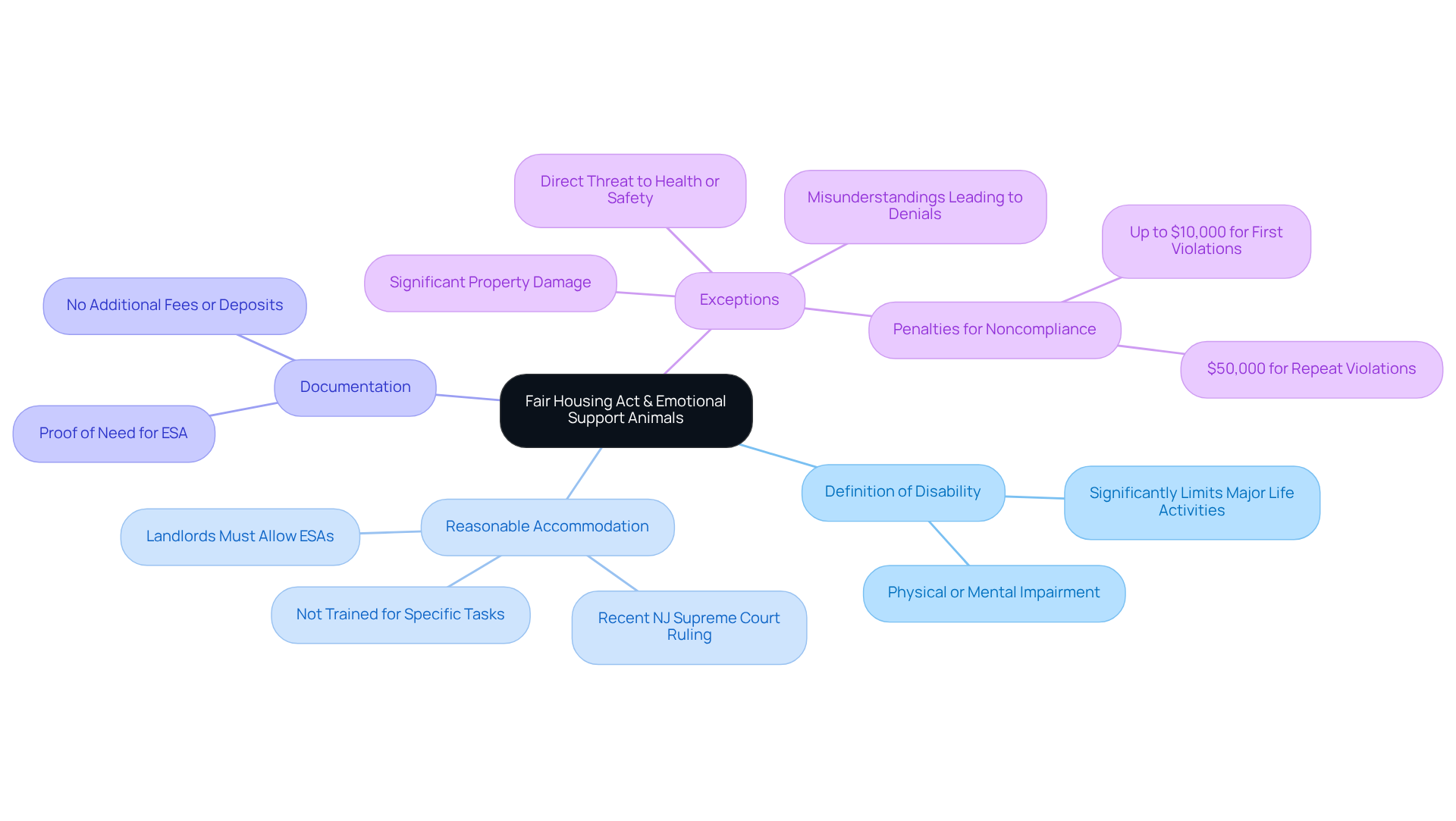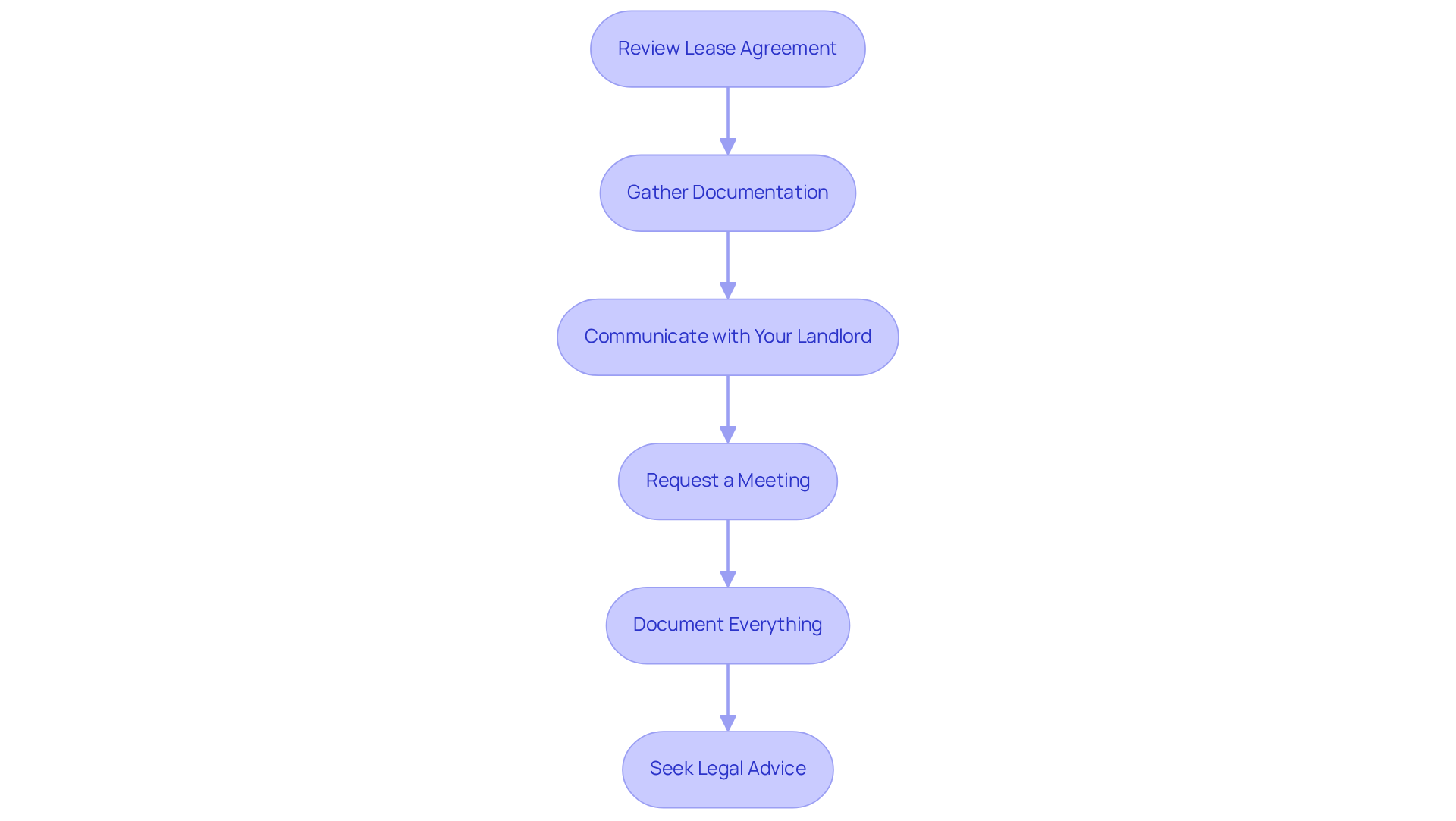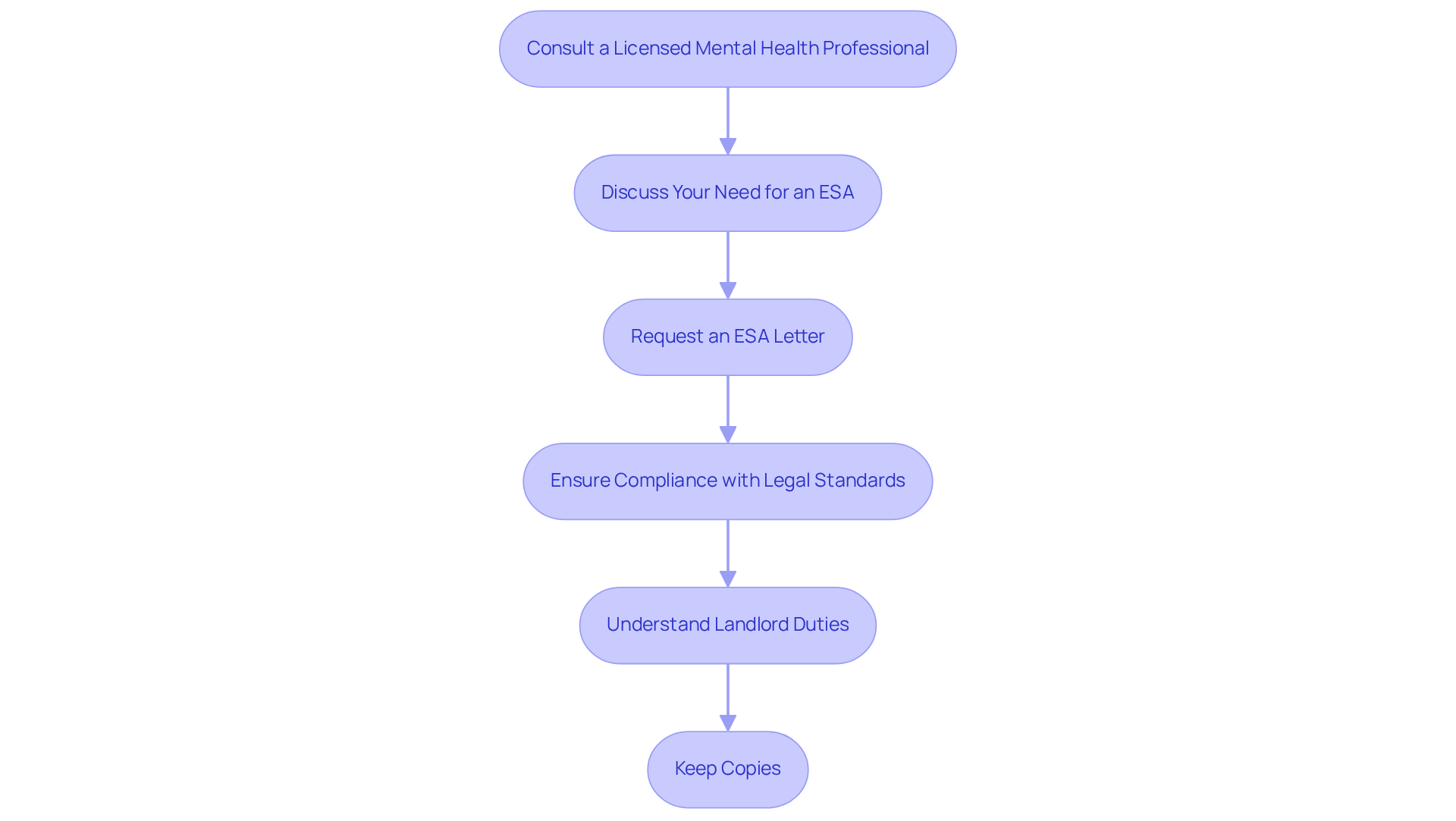

Can a Landlord Make You Get Rid of Your Dog? Know Your Rights
by Lena Park
Last updated: August 16, 2025
Verified and Approved by:
Angela Morris,
MSW, LCSW
Fact Checked

Overview
If you’re facing the emotional challenges that often accompany mental health issues, it’s important to know that your landlord cannot legally force you to part with your dog if it serves as an emotional support animal (ESA) under the Fair Housing Act. This act is designed to provide reasonable accommodations for individuals with disabilities, allowing you to keep your beloved companion by your side.
Understanding your rights as a tenant is crucial. You have the right to maintain your ESA, and there are specific documentation requirements that can help you navigate this process. It’s essential to be aware of your landlord’s legal obligations, as well as the potential penalties they may face for discriminating against tenants who need support animals.
Remember, you are not alone in this journey. The presence of an emotional support animal can offer significant comfort and companionship, helping to alleviate feelings of loneliness and anxiety. As you explore your options, consider obtaining an ESA letter, which can serve as a supportive solution in ensuring that your needs are met.
Reflect on how your ESA has positively impacted your life. Have they provided you with comfort during difficult times? By understanding the legal protections available to you, you can feel more empowered and secure in your living situation. It’s a reassuring thought that support is available, and you deserve to have your emotional needs recognized and accommodated.
Introduction
Navigating the complexities of pet ownership in rental housing can be particularly challenging for tenants with emotional support animals (ESAs). Many individuals with mental health issues face significant emotional struggles, and the companionship of an ESA can provide much-needed comfort and support.
The Fair Housing Act offers essential protections, ensuring that individuals with disabilities can live with their support animals, even in no-pet policies. However, misunderstandings about these rights can lead to conflicts with landlords, raising a critical question: can a landlord legally require tenants to remove their beloved dogs?
This uncertainty can be distressing, as the bond between a tenant and their ESA is often profound. This article delves into the rights of tenants under the Fair Housing Act, offering valuable insights and actionable steps to advocate for the continued companionship of emotional support animals.
Remember, you are not alone in this journey; support is available to help you navigate these challenges.
Understand Your Rights Under the Fair Housing Act
The Fair Housing Act (FHA) serves as a vital protection for individuals with disabilities, granting them the right to have a support pet, known as an emotional support animal (ESA), in their homes. Understanding these rights is essential for tenants navigating the complexities of housing policies, especially when emotional well-being is at stake. Let’s explore some key points together:
-
Definition of Disability: The FHA defines a disability as a physical or mental impairment that significantly limits one or more major life activities. This broad definition ensures that individuals with various conditions receive the protection they deserve.
-
Reasonable Accommodation: It’s important to know that landlords are required to provide reasonable accommodations for tenants with disabilities. This includes allowing ESAs, even in properties that have no-pet policies. A recent ruling by the New Jersey Supreme Court in March 2024 reaffirmed the necessity of ESAs for individuals facing mental health challenges. While ESAs offer emotional comfort, it’s crucial to remember that they are not trained to perform specific tasks like service dogs, meaning they do not have the same legal rights to access public spaces.
-
Documentation: You might wonder about the documentation needed for an ESA. While landlords can request proof of the need for an ESA, they cannot impose additional fees or deposits specifically for your pet. This aligns with legal precedents aimed at preventing discrimination against tenants who require support animals.
-
Exceptions: There are a few exceptions to these provisions, primarily if the animal poses a direct threat to the health or safety of others or causes significant property damage. Unfortunately, there have been cases where landlords mistakenly denied ESA requests due to misunderstandings of their legal obligations. This can lead to serious consequences, including penalties of up to $10,000 for first-time violations and $50,000 for repeat offenses.
Understanding these rights is crucial for determining if a landlord can make you get rid of your dog and ensuring that you can keep your beloved companion by your side. As we recognize the growing acknowledgment of the importance of ESAs in supporting mental health, it becomes even more vital to advocate for your needs and the comfort that your ESA brings to your life.

Take Action: Steps to Advocate for Your Emotional Support Animal
If your landlord questions your right to have an emotional support animal (ESA), you may be asking yourself, can a landlord make you get rid of your dog; it’s important to know that you’re not alone in this situation. Many individuals face similar challenges, and advocating for your needs can feel overwhelming. Here are some compassionate steps to help you navigate this process effectively:
-
First, take a moment to review your lease agreement. Look for any clauses concerning pets or assistance animals. Understanding these terms is essential, as it empowers you to advocate for your rights.
-
Next, gather documentation. Secure a valid ESA letter from a licensed mental health professional. This letter should clearly indicate your need for the pet due to a diagnosed mental health condition, including all necessary legal elements. Having this documentation is a vital part of your advocacy.
-
Then, communicate with your landlord. Initiate written communication, outlining your rights under the Fair Housing Act and attaching your ESA documentation. It’s important to maintain a polite yet assertive tone in your request, as this can foster a more positive dialogue.
-
If necessary, request a meeting. A face-to-face conversation can help clarify misunderstandings and promote a collaborative dialogue. This personal touch can often make a significant difference in communication.
-
Additionally, remember to document everything. Keep detailed records of all interactions with your landlord regarding your ESA. This documentation is crucial if you need to escalate the matter later on.
-
Finally, if your landlord continues to deny your request or threatens eviction, consider seeking legal advice to understand if can a landlord make you get rid of your dog. Consulting a legal professional specializing in tenant rights and housing discrimination can provide you with the guidance and support you need.
By following these steps, you can assert your rights with confidence and ensure that your beloved companion remains a part of your life. Remember, you deserve support and understanding as you navigate this journey.

Obtain Valid Documentation for Your Emotional Support Animal
To ensure that your emotional support animal is recognized legally, it’s important to follow these steps to obtain valid documentation that can truly make a difference in your life:
- Consult a Licensed Mental Health Professional: Begin by scheduling an appointment with a licensed therapist, psychologist, or psychiatrist who can thoughtfully evaluate your mental health needs.
- Discuss Your Need for an ESA: During your consultation, take the time to explain how your emotional companion helps in alleviating your symptoms. Being open about your mental health condition and how your pet provides support is crucial in this conversation.
- Request an ESA Letter: If the mental health professional agrees that an ESA is appropriate for your situation, kindly request a formal ESA letter. This letter should include:
- Your name and the date of the letter
- The professional’s name, credentials, and contact information
- A statement confirming your need for an ESA due to a diagnosed mental health condition
- A description of how the animal assists you
- Ensure Compliance with Legal Standards: It’s essential to make sure the letter adheres to the requirements set forth by the Fair Housing Act. Importantly, it should not contain any language that implies the animal is a service creature, as ESAs are not covered under the same regulations. Remember, support animals are only permitted in your assigned residence hall bedroom and must be fully house-trained and up to date on vaccinations.
- Understand landlord duties: Be aware that landlords have specific rights and obligations, including situations where they might ask, ‘can a landlord make you get rid of your dog’ in relation to assistance animals. They cannot refuse your request for an ESA if you provide valid documentation, but if you do not follow the guidelines regarding the animal’s behavior and care, can a landlord make you get rid of your dog?
- Keep Copies: Once you receive the letter, consider making several copies to provide to your landlord and to keep for your records.
By thoughtfully following these steps, you can secure the necessary documentation to support your right to have an emotional support animal in your home. This process not only highlights the importance of ESAs but also reassures you of the support available in navigating the legal distinctions between emotional support animals and service dogs.

Conclusion
Understanding the rights associated with emotional support animals (ESAs) is crucial for tenants who may face challenges from landlords regarding pet policies. The Fair Housing Act provides essential protections, ensuring that individuals with disabilities can keep their support animals, even in no-pet housing. This legal framework empowers tenants to advocate for their needs, safeguarding their emotional well-being and the companionship of their beloved pets.
Many individuals face emotional challenges that can feel overwhelming, especially when navigating housing situations that may not accommodate their needs. The presence of an ESA can provide immense comfort and support, helping to alleviate feelings of isolation and anxiety. Throughout the article, key points such as the definition of disability under the FHA, the requirement for reasonable accommodations, and the necessary documentation for ESAs have been discussed. It is clear that landlords must respect these rights, and tenants should be aware of the exceptions that exist. By understanding the legal landscape, individuals can navigate potential conflicts with landlords more effectively.
Ultimately, the journey to securing the right to keep an emotional support animal involves knowledge, preparation, and assertiveness. Tenants are encouraged to take proactive steps, such as reviewing lease agreements, gathering necessary documentation, and communicating clearly with landlords. By doing so, individuals can not only protect their rights but also foster an environment of understanding and support, ensuring that their emotional support animal remains a cherished part of their lives. Remember, you are not alone in this journey; there is support available to help you advocate for your needs and maintain the companionship that is so vital to your emotional health.
Frequently Asked Questions
What is the Fair Housing Act (FHA)?
The Fair Housing Act (FHA) is a law that provides vital protections for individuals with disabilities, including the right to have an emotional support animal (ESA) in their homes.
How does the FHA define a disability?
The FHA defines a disability as a physical or mental impairment that significantly limits one or more major life activities.
Are landlords required to accommodate emotional support animals?
Yes, landlords are required to provide reasonable accommodations for tenants with disabilities, which includes allowing emotional support animals even in properties with no-pet policies.
What recent legal ruling supports the need for emotional support animals?
A ruling by the New Jersey Supreme Court in March 2024 reaffirmed the necessity of emotional support animals for individuals facing mental health challenges.
What is the difference between emotional support animals and service dogs?
Emotional support animals provide emotional comfort but are not trained to perform specific tasks like service dogs, and therefore do not have the same legal rights to access public spaces.
What documentation can landlords request for an emotional support animal?
Landlords can request proof of the need for an emotional support animal, but they cannot impose additional fees or deposits specifically for the pet.
Are there any exceptions to the provisions for emotional support animals?
Yes, exceptions exist if the animal poses a direct threat to the health or safety of others or causes significant property damage.
What are the consequences for landlords who deny emotional support animal requests improperly?
Landlords can face serious penalties, including fines of up to $10,000 for first-time violations and $50,000 for repeat offenses.
Why is it important to understand your rights under the FHA regarding emotional support animals?
Understanding your rights is crucial to determine if a landlord can require you to get rid of your emotional support animal and to ensure you can keep your companion, which is vital for your emotional well-being.
Certify Your Emotional Support Animal Today

Why You Can Rely on Us?
At Wellness Wag, we believe your pet deserves care rooted in both science and compassion. Each article is carefully researched, written in clear language for pet owners, and then reviewed by qualified professionals to ensure the information is evidence-based, current, and practical for real-life care. Our goal is to help you feel confident in making informed decisions about your pet’s health and well-being.
Reviewed by
Angela Morris, MSW, LCSW
Angela is a licensed clinical social worker with 20 years of experience in patient advocacy and community mental health. She has assisted numerous clients with ESA evaluations and brings a deep understanding of disability accommodations, ensuring that all information is accurate, supportive, and practical.

Written by :
Lena Park
Last Updated :
August 16, 2025












